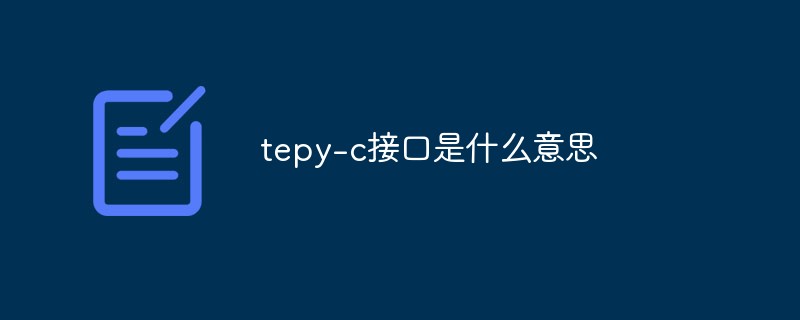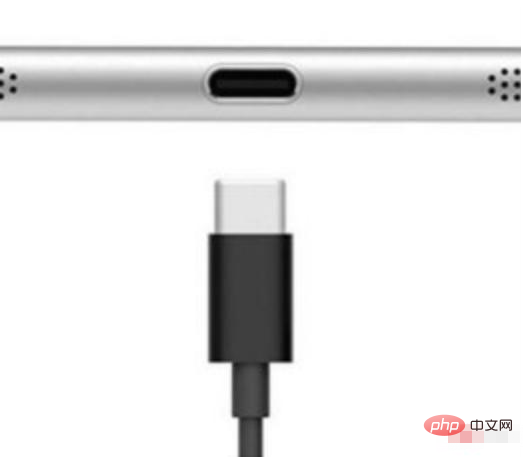
The tepyc interface is a form of USB interface. It is a hardware interface specification for universal serial bus USB. It is a connection surface of the USB interface. It can be inserted into both the front and back sides. The size is about [ 8.3mm × 2.5mm], like other types of interfaces, it supports USB standard charging, data transmission, display output and other functions.

tepy-cThe full name of the interface is USB Type-C interface, or USB-C for short. It is a USB interface form and a universal Hardware interface specification for serial bus (USB).
After USB Type-C was launched in 2014, it was first applied to the Nokia N1 tablet at the end of the year;
It was applied to Google Chromebook Pixel in early 2015, but it is really well-known to the public with the help of The popularity of Apple’s ultra-thin Macbook.

Type-Cis a connection surface of the USB interface. It can be inserted into both the front and back sides. The size is about 8.3mm×2.5mm. Like other types of interfaces, it supports USB standard charging, data transmission, display output and other functions.
Nowadays, mainstream mobile phones basically use Type-c interface. OPPO and vivo, which have always adhered to the Micro USB interface camp, also used Type-c in the newly released OPPO Find X and vivo NEX. Interface, Type-c has replaced Micro USB as one of the mainstream mobile phone interfaces.
Why are many new mobile phones, laptops, mobile power supplies and other electronic devices now using the Type-c interface?
First of all, the USB Type-C interface does not distinguish between front and back, so In the past, the embarrassment of "it can't be inserted here, and it can't be inserted in turn, and it can't be inserted in again," no longer exists, and the damage caused by "strength can work wonders" can also be avoided. This setting is especially important in an environment with no lights at night. You only need to touch the data cable and plug it into your phone to charge. This convenience is obviously unmatched by the previous Micro USB interface.
Another point is the improvement in transmission speed. In December 2013, the USB3.0 technical team announced that the next generation type-C connector transmission speed supports up to 5Gbps and 100W power transmission. At the same time, it can also provide reverse power supply to other devices. Nearly five years have passed, and type-C technology and practical applications have also entered a mature stage.
The Type-c interface can provide bidirectional power supply, which can charge the device itself and provide power to external devices. For example, the Type-c interface used by Greenlink Wireless Power Bank supports both input and output. Compared with the Micro USB interface, the mobile power supply uses a Type-c interface, and it can also have more interfaces to charge multiple mobile phones at the same time.
In terms of compatibility, Type-C has advantages that Micro usb does not have. Type-C can be compatible with USB2.0, 3.0, and 3.1 interfaces, and there is no need to change much in the internal structure; The Micro USB interface has undergone structural changes since USB3.0, so there are currently not many mobile phones using the 3.0 interface. This interface can also be directly compatible with other devices that support Type-C interface. Type-C supports 100w power support. In this era of fast charging, 100w power support will be a catalyst in the field of fast charging. Fast charging is based on Type- The C interface will be well supported, and fast charging will also become popular.
In general, the Type-C interface has five characteristics: slimness, fast transmission speed, non-directionality, strong power supply capability, and strong scalability. Type-C interface has now become the mainstream interface. Although the cost is higher, this is also an inevitable change in today's increasingly fierce competition in the mobile phone market.
Related free recommendations:Programming video course
The above is the detailed content of What does tepy-c interface mean?. For more information, please follow other related articles on the PHP Chinese website!
 What does b-side and c-side mean?
What does b-side and c-side mean? c/s architecture and b/s architecture
c/s architecture and b/s architecture python absolute value
python absolute value What does WeChat clone mean?
What does WeChat clone mean? The main function of the arithmetic unit in a microcomputer is to perform
The main function of the arithmetic unit in a microcomputer is to perform netframework
netframework Can Douyin short videos be restored after being deleted?
Can Douyin short videos be restored after being deleted? What to do if css cannot be loaded
What to do if css cannot be loaded